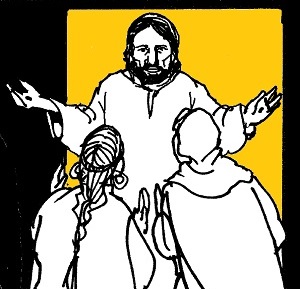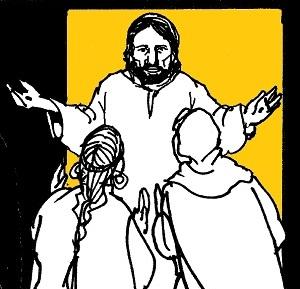

“Here I am, Lord; I come to do your will” (Psalm 40:8).
Jgs 11:29-39a; Matt 22:1-14
You would think that the story of Abraham and Isaac (Genesis 22) would have settled the question of child sacrifice for the Israelites. But the tragic story of Jephthah survives in the tradition of the Judges to affirm the heroic faith of a father willing to sacrifice his child to keep a vow. We are likely dealing with layers within the tradition being assembled that obscure the development of a more mature rejection of the primitive, pagan practice of human sacrifice. Jephthah’s decision to offer up his daughter horrifies us.
The same reaction to the violence in the parable of the wedding feast may also be a matter of layers in the redaction of the original parable of Jesus about a wedding that emphasizes the urgency of responding to God’s invitation to enter the reign of God. Luke and Matthew apply the parable to the church in the light of the destruction of Jerusalem after Israel’s leaders reject Jesus. They forfeit the chance for peace and miss the love story God wanted for his people.
The revised parable adds the history of killing the prophets, the destruction of the ungrateful guests and filling the hall with outsiders. Matthew adds the disturbing detail of a late guest who is thrown out for not having the proper garment. Was he a Gentile convert who joined the church but lacked real conversion and a change in moral behavior? Sorting out the many themes and lessons in these texts makes it a challenge to find the Good News.
One image in the Gospels is likely more real than symbolic. When Jesus arrived in Jerusalem after his long walking campaign through the cities and villages of Galilee, Samaria and Judea to proclaim God’s mercy, he breaks down in tears over the city. Despite his many miracles of healing and signs of love for everyone, especially the poor, his outreach to sinners and efforts to win over his enemies, he has encountered only rejection and resistance. So many of his parables lament this failure of people to hear God’s invitation. Jesus has only his death to complete what his life could not accomplish.
This becomes the ultimate Good News, that Jesus laid down his life not only for his friends but also for his enemies. Unconditional, undeserved, unlimited love for sinners is what saves the world. All that is required is that we believe it and let it change us from the inside out so that it flows from us to others. Love is the garment that makes our lives a wedding feast to which everyone is welcome.
Advertisement






